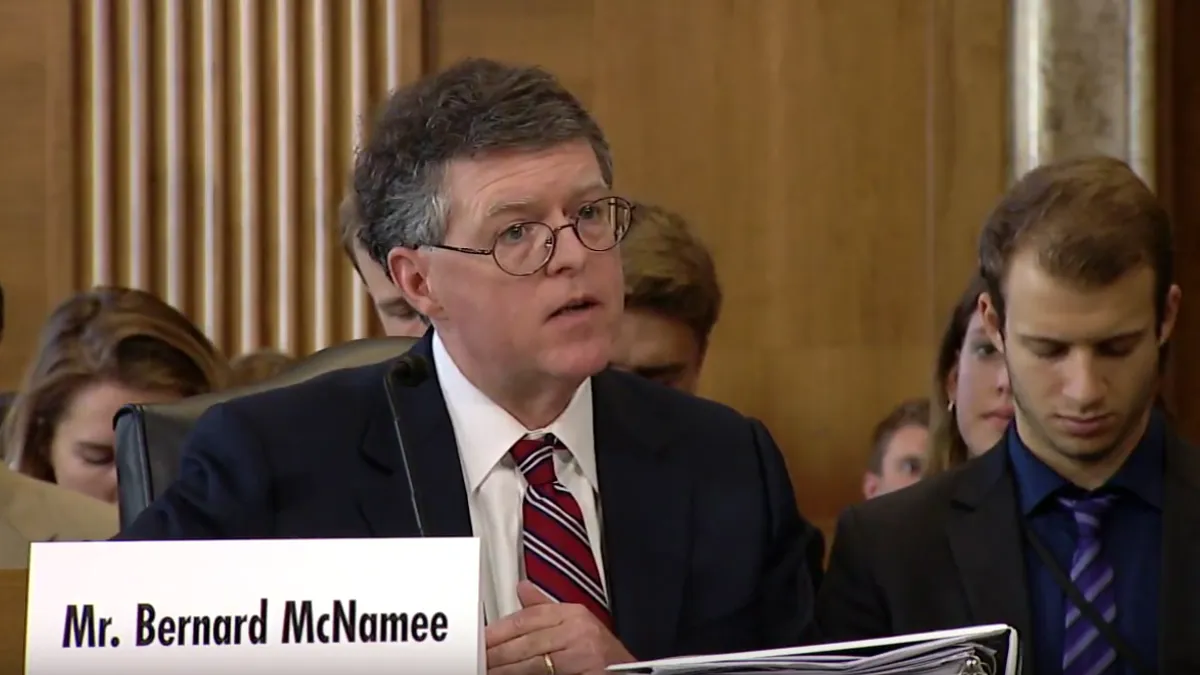Dive Brief:
-
President Trump's nominee to the Federal Energy Regulatory Commission told senators Thursday he would preserve the agency's independence if confirmed, despite previously helping craft a coal and nuclear bailout that FERC rejected early this year.
-
McNamee pledged to be an "independent arbiter" on FERC and to separate his decisions as a regulator from his previous role at the Department of Energy, where he worked on the bailout plan. He declined, however, to say if he would recuse himself from similar issues at FERC.
-
Sen. Lisa Murkowski, chair of the committee that oversees McNamee's nomination, said she was generally satisfied with his testimony and hopes the full Senate will confirm him and other nominees before the end of the year.
Dive Insight:
Drama over McNamee's nomination highlights the continuing debate at FERC and Congress over how to respond to the retirement of coal and nuclear plants.
Last year, the DOE proposed a bailout for at-risk plants at FERC, arguing ratepayers should prop up retiring generators that can keep three months of fuel supply onsite. FERC unanimously rejected the plan in January.
McNamee was head of the DOE office that worked on the bailout plan and signed his name to the cover letter sent to FERC, but he told senators he would view the proposal differently if confirmed to the commission.
"I understand the difference in my role as a lawyer when I worked on [the bailout] proposal ... and what the role of FERC is," McNamee said. "I can honestly say I would be an independent arbiter if the [coal and nuclear] issues come before me at FERC. I think it's important to look at the law and the facts and make decisions based on that."
McNamee repeatedly compared his situation to that of state regulators he interacted with as a private energy lawyer in Virginia, where he worked before his DOE job. Many of those regulators had past partisan affiliations, he said, but set them aside when nominated to a regulatory body.
"They were able to separate out what their past lives were and they were going to make decisions based on what the law was and what the facts were," McNamee said. "I pledge to you I will do my best to do the same."
"I don't say this just because I'm trying to get your vote," McNamee added. "It's something I believe because I think the rule of law depends on the fact that people who are in the position of making decisions, that they listen."
After FERC rejected DOE's plan, President Trump in March directed the agency to devise an emergency program to keep coal and nuclear plants online. That plan is still under discussion at the White House, and McNamee said he was not involved in its design.
"I was not at DOE when the memo was crafted or leaked," McNamee said, referring to a document leaked from the White House in May outlining the plan. The nominee said he only reviewed the memo when he returned to the agency later that year "to try to understand it" from a legal standpoint.
A central argument underpinning the Trump administration's push for a coal and nuclear bailout is that the retirement of those plants constitutes an "emergency" for the reliability and resilience of the nation's power system.
McNamee distanced himself from that narrative, saying that if there were an emergency, the Secretary of Energy would issue an order under Section 202(c) of the Federal Power Act to keep essential generators online.
"The secretary currently has not issued a 202(c) and I have no reason to second guess his determination," McNamee said. "It does not appear to this point on a general nationwide basis that there is an emergency."
Several Democratic senators pressured McNamee to commit to recusing himself from issues regarding coal and nuclear supports if they come up at FERC again. The nominee, however, refused to commit to a recusal, saying the specific docket regarding the DOE proposal is already closed, and that any similar issues would have to be vetted by ethics lawyers at FERC.
McNamee's answer displeased some Democrats, but Murkowski said she understood the nominee's position.
"He stated clearly that case he had worked on … has been closed down," Murkowski said. "So if it is a question as to that, then it seems to be you've got a recusal issue going on, but if it's a question of something else that spins off that, would that require recusal? I think that's when you get your lawyers in there and you make clear one way or another. He said he would follow that guidance, which is the appropriate course."
Murkowski said she also appreciated McNamee's commitment to view coal and nuclear issues differently at FERC than at his old job.
"What I took away was that his role when he was at the Department of Energy was to take the Secretary's directive and to draft that policy," she said. "His role at the FERC would be different than that and I would expect that he would respect those lanes."
With Murkowski's endorsement, McNamee is likely to be approved by the Senate Energy and Natural Resources Committee, a necessary step before submittal to the full Senate. Committee Republicans are likely to support him, along with Sen. Joe Manchin, D-W.Va., a supporter of the White House's coal bailout push.
"I'm probably one of the only ones on my side who appreciates where you're coming from," Manchin told McNamee, referring to coal and nuclear issues. "I appreciate your position."














